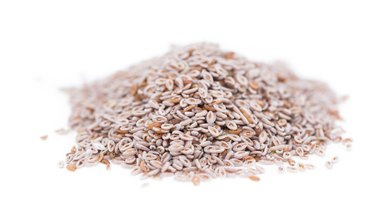
Even though psyllium is a very effective laxative, it's actually a soluble fiber, which is unusual because soluble fibers are not known for laxative abilities -- a job that falls to insoluble fiber. In addition to it's laxative abilities, psyllium provides all the same benefits as soluble fibers. It's also a prebiotic fiber, which means it supports the good bacteria in your colon.
Psyllium Husk Rundown
Video of the Day
Psyllium husks come from seeds of the psyllium plant, which you may also see referred to as the plantago or ispaghula plant. Psyllium is classified as a functional fiber rather than a dietary fiber because the soluble fiber is extracted from the seeds and added to foods or used in supplements. You'll find psyllium listed as the active ingredient in some over-the-counter laxatives. It also lowers levels of cholesterol and helps regulate levels of blood sugar after eating, according to studies cited in a report from the Institute of Medicine.
Video of the Day
Prebiotic Fiber Overview
A prebiotic is any type of fiber that is fermentable and supports the growth or activity of good bacteria in your colon. It's important to sustain the colonies of good bacteria that normally live in your large intestine because they help maintain a strong immune system and boost overall health. As prebiotic fibers are fermented, they increase the amount of bacteria and produce energy used by cells that line your colon.
Psyllium as Prebiotic
You may not find psyllium included in lists of prebiotic fibers, but it does have prebiotic effects, according to a report in the April 2013 issue of "Nutrients." In fact, researchers studying fermentable fibers and inflammatory bowel disease sometimes use psyllium as a prebiotic. Psyllium ferments more slowly than other prebiotic fibers. As a result, it may produce less unwanted gas and deliver prebiotic benefits throughout the length of the colon, according to the July 2011 issue of the "Journal of Food Science."
Potential Health Benefits
When prebiotics and probiotics are combined in the same product, the result is called a synbiotic. While more research into synbiotics is needed to determine their effectiveness, taking psyllium with probiotics may help treat inflammatory bowel disease. In one study, patients with ulcerative colitis were divided into three groups, with each group taking either probiotics, prebiotics or synbiotics. The synbiotic group took probiotics with 9.9 grams daily of psyllium as the prebiotic. This group saw better improvement in symptoms than the other groups, according to a report in the May 2009 issue of "Nutrition."
- Institute of Medicine: Dietary Reference Intakes for Energy, Carbohydrate, Fiber, Fat, Fatty Acids, Cholesterol, Protein, and Amino Acids
- Linus Pauling Institute: Fiber
- Nutrients: Fiber and Prebiotics: Mechanisms and Health Benefits
- Academy of Nutrition and Dietetics: Prebiotics and Probiotics: The Dynamic Duo
- Journal of Gastroenterology and Hepatology: High dose Probiotic and Prebiotic Cotherapy for Remission Induction of Active Crohn’s Disease
- Journal of Food Science: In Vitro Batch Fecal Fermentation Comparison of Gas and Short-Chain Fatty Acid Production Using “Slowly Fermentable” Dietary Fibers
- Nutrition: A Randomized Controlled Trial on the Efficacy of Synbiotic Versus Probiotic or Prebiotic Treatment to Improve the Quality of Life in Patients with Ulcerative Colitis